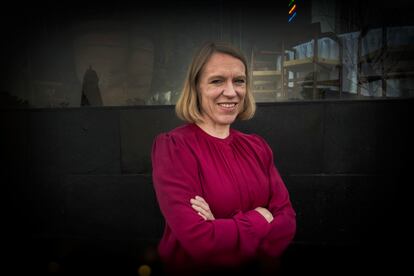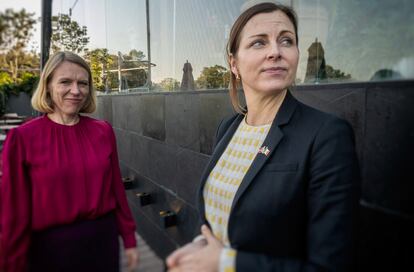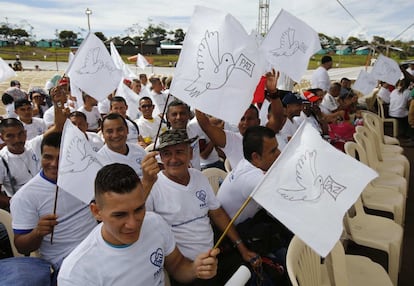Norway and the diplomacy of peace
Oslo has developed a foreign policy based on facilitating negotiation, having participated in the resolution of more than 40 conflicts worldwide in recent decades

“Usually with politicians, when they have a microphone in front of them, they control themselves and tell someone else in private what they’re really thinking. In Venezuela it is the other way around: what you say to a politician in private you amplify with a microphone in front of you. We offer no guarantee of discretion.” Every now and then, a high-profile Venezuelan politician will resort to this anecdote to try and explain some of the reasons that make it so difficult to negotiate a solution to the institutional crisis in the Latin American country. Reminded of this, Norwegian Minister of Foreign Affairs Anniken Huitfeldt nods and does not try to conceal a smile as she looks at Idun Tvedt, deputy director of the Ministry’s Section for Peace and Reconciliation. Through their different roles, both have experienced the complexities of Venezuelan politics, among many others: they form part of the most discreet actor in recent peace processes around the world: this is how Norway conducts its peace diplomacy.
Norway’s first involvement in an international peace process was in Guatemala in the 1990s, at the request of civil society groups. Although that first intervention came with “many, many failures,” it formed the basis on which Norway’s peace diplomacy has been built. After Guatemala came negotiations between Israel and Palestine, the followed Sudan, Mali, Ethiopia, Sri Lanka, Colombia, Venezuela… it is estimated that some 120 Norwegian diplomats have participated in at least 40 peace processes the world over, including those that comprise a special department of 16 people set up 20 years ago and which operates as a type of elite unit for peace and reconciliation. “We don’t travel the world looking for conflicts or pressurizing parties [to negotiate], but when we are approached, and we see that we are able, we share the facilitation knowledge we have acquired,” says Huitfeldt.
Facilitate, not mediate: Huitfeldt underlines the distinction several times during the conversation, which took place recently in Mexico City, in front of the lake in the Chapultepec park. A couple of hours away from there, Norway has just held a retreat for experts in conflict resolution. And closer still to the forested park in the south of the city, a Norwegian team is part of the talks between the Colombian government and the National Liberation Army (ELN), the last active guerrilla group in Latin America. A previous negotiation in Colombia involving the Revolutionary Armed Forces of Colombia (FARC) is one of Norwegian diplomacy’s greatest successes, one that Huitfeldt highlights, perhaps because it was so complicated. “We talked to all the parties in the conflict, including those we condemn. At the time it was controversial that we did so with the Taliban, Hezbollah, Hamas or the FARC itself. We could be criticized for that, but we believe it is the only way to solve a conflict.”

Huitfeldt structures Norway’s work around four ideas: “The first is that we have to be discreet: we don’t tend to feature in the media. If the parties want to say something, they can, but we can only do so if they disagree with us. This is proving to be an exception,” she jokes. “Impartiality is a fundamental principle for us as facilitators. We don’t apply pressure; we are a small country, with a small army and a small economy, we can’t pressure them to cooperate! What we can do is facilitate talks, trying to understand what solutions we can put forward. Peace can only be achieved if the parties show willingness to work towards a political solution.” Norway’s impartiality in a negotiation does not though imply neutrality, for example in the case of the Taliban. “We cannot be neutral on issues such as the rights of women and children.”
One of the clearest examples of the advances this discretion and impartiality can achieve has been in Venezuela. Norway was one of the few full democracies that did not recognize Juan Guaidó as Venezuela’s interim president in 2019, a gamble on which the world’s major powers tripped up. “Had we done so, we would not have been able to take on the role of facilitator,” notes Tvedt.
The only instance to date where Norway’s impartiality has proven chimerical is with Ukraine. “We can’t [facilitate talks], because we have a border with Russia,” says Huitfeldt, who adds Oslo has given military support to Ukraine, the first time Norway has provided arms in a conflict since it did so in Cuba in the face of Fidel Castro’s advance. “Ukraine’s defense against invasion and the consequences of the war globally demand our attention; we can support Ukraine with our experience of peace and reconciliation if requested,” she says.

Patience is an equally important element of Norway’s diplomacy. The peace process between the Colombian government and the FARC has been dragging on for at least a decade: first there was the phase of secret talks, then the negotiation table in Havana, and finally the implementation of the agreement. Norway has been present at every stage. “Being patient is another key. The parties have to be clear that Norway is going to be there in the good times and the bad times: they have to trust us.” This can involve years of back and forth, of feeling out the terrain and the parties involved and of making sure, the two diplomats stress, who those parties represent and whether or not they are legitimate representatives - something which becomes incredibly complex when verifying who the interlocutors of an armed guerrilla group are.
After explaining Norway’s evolution in peace processes and the lessons learned over the years, Huitfeldt alights on a point that she says is key to explaining how it has been possible to get this far: “There is more likelihood of failure than success,” she says. Tvedt complements this observation with an optimistic note: “Conflicts are increasingly complex, but there is also more demand for mediation; most end up at the negotiating table at some stage. Even when efforts have not proven sufficient, they will not have been in vain. They may have increased the chances of coming to a peaceful solution later on. And, in the meantime, they may have saved thousands of lives.”
Sign up for our weekly newsletter to get more English-language news coverage from EL PAÍS USA Edition
Tu suscripción se está usando en otro dispositivo
¿Quieres añadir otro usuario a tu suscripción?
Si continúas leyendo en este dispositivo, no se podrá leer en el otro.
FlechaTu suscripción se está usando en otro dispositivo y solo puedes acceder a EL PAÍS desde un dispositivo a la vez.
Si quieres compartir tu cuenta, cambia tu suscripción a la modalidad Premium, así podrás añadir otro usuario. Cada uno accederá con su propia cuenta de email, lo que os permitirá personalizar vuestra experiencia en EL PAÍS.
¿Tienes una suscripción de empresa? Accede aquí para contratar más cuentas.
En el caso de no saber quién está usando tu cuenta, te recomendamos cambiar tu contraseña aquí.
Si decides continuar compartiendo tu cuenta, este mensaje se mostrará en tu dispositivo y en el de la otra persona que está usando tu cuenta de forma indefinida, afectando a tu experiencia de lectura. Puedes consultar aquí los términos y condiciones de la suscripción digital.









































